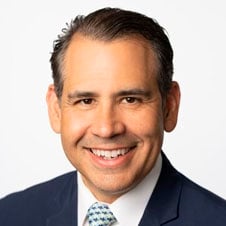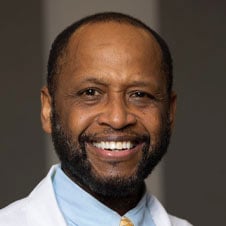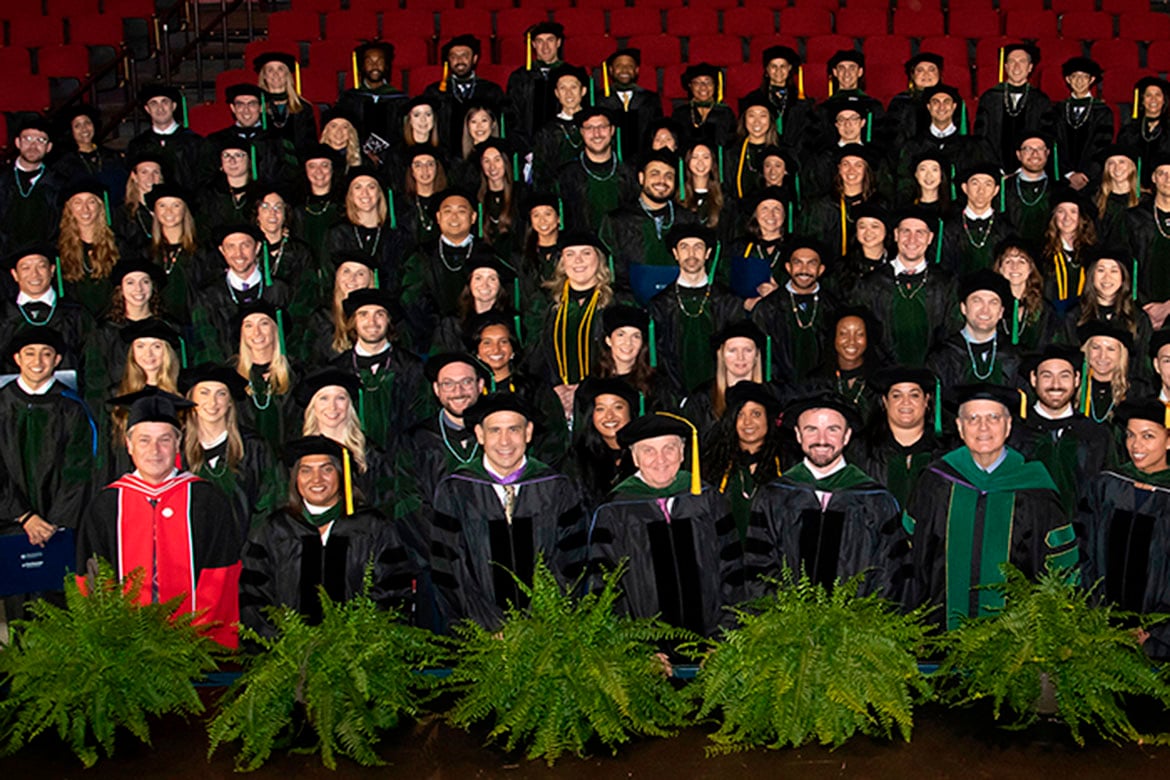When the nation’s health care organizations were scrambling to find personal protective equipment (PPE) during the COVID-19 pandemic, Ochsner Health came up with a sustainable solution.
The New Orleans-based health system partnered with a local company to start a PPE-manufacturing business, SafeSource Direct, to ensure that it had a reliable source of quality exam gloves, N95 respirators, hair-bouffant head covers and isolation gowns.
Ochsner Health is taking the same approach in addressing its shortages of physicians, nurses and other health professionals by partnering with local institutions to educate and train staff to build its workforce.
Ochsner Health is a member of the AMA Health System Program, which provides enterprise solutions to equip leadership, physicians and care teams with resources to help drive the future of medicine.
The health system invested more than $5 million to operate 29 workforce programs with more than 1,200 people participating in 2022, Leonardo Seoane, MD, executive vice president and chief academic officer at Ochsner Health, told the U.S. Senate Health, Education, Labor and Pensions Committee last year.
“We have focused efforts on increasing the supply of nurses, growing the pathway of high school and college students entering health care-training programs, and advancing existing employees by offering ‘earn as you learn’ programs,” Dr. Seoane told senators.
Finding effective partners
This do-it-yourself spirit “is a culture that's evolved, and its evolution was accelerated with Hurricane Katrina,” Dr. Seoane said in an interview, referring to the 2005 catastrophe.
He adds, however, that Ochsner Health isn’t taking on this load all by itself. It is partnering with institutions from all over the region and as far away as Australia to take on these workforce challenges.
Yvens Laborde, MD, chief community medical officer for Ochsner, noted that one way to address the primary care physician shortage is to use physician-led team-based care—but finding people to fill every spot on the team can be challenging.
“I've been in practice for more than 20 years, and the nursing shortage has been an issue as far back as I can remember—but it's been exacerbated by the stress of the pandemic,” Dr. Laborde said.
“The nursing crisis is similar to the physicians’ in that the numbers are almost hard to grasp,” Dr. Seoane said. “There's also an allied health-professional crisis. “We don't have enough” radiology technicians, labratory technitions, surgical technicians—“you name it.”
Ochsner Health is taking “now, near and far” approaches to meeting immediate demands while developing pathways for addressing long-term needs.
“That ‘now’ is about focusing on burnout and retention and making sure our turnover rate is as low as possible,” Dr. Seoane said.
To address the needs of the near future, Ochsner Health has partnered with several institutions to find innovative ways to build its workforce. This includes the system’s collaboration with Australia’s University of Queensland in which students split their time between two continents.
Since the first class graduated in 2009, about 30% of the program’s new physicians have remained in Louisiana. This year’s graduation will include the 1,000th doctor to receive a diploma from the program.
This summer, the first physician to complete the Ochsner Physician Scholars program with the Louisiana State University (LSU) Health Shreveport School of Medicine will start practicing in a rural area of the state.
“She finishes her family medicine residency and starts in July, so I think that's already paying dividends,” Dr. Seoane said.
Medical students from LSU, the University of Queensland and Ochsner Clinical School can apply to the program. If selected, they receive payment from Ochsner Health intended for medical school expenses. In exchange, the student commits to work in an Ochsner Health facility for five years after completing a residency program in either family medicine, internal medicine primary care, internal medicine pediatrics primary care (dual certification), or psychiatry.
The system announced in January 2023 its plan to develop the Xavier Ochsner College of Medicine. It is expected to open in about four years with an initial class of 50 students.
Along with a new medical school at Morgan State University, it will join the nation’s four existing historically Black medical schools: Howard University College of Medicine, Morehouse School of Medicine, Meharry Medical College, and the Charles R. Drew University of Medicine and Science.
“The partnership with Xavier University of Louisiana is going to have an explicit mission to train more diverse physicians who represent the communities they serve,” Dr. Seoane said.
Black people account for between 13% and 15% of the U.S. population, but only 5% of practicing physicians, he noted. Meanwhile, Hispanics make up about 20% of the U.S. population, but only about 6% of the physician workforce.
Building diverse health care team
Ochsner Health has been partnering with Xavier’s College of Pharmacy since 1982. The school and the health system established a bachelor’s degree in medical laboratory science in 2021. And last May, the first 37 students graduated from the Xavier-Ochsner physician assistant program.
A May 2025 graduation ceremony will be held for the inaugural class of the Loyola University of New Orleans nursing program, which features clinical training at Ochsner Health facilities. Meanwhile, during the same month, the first classes will be offered in Ochsner Health’s nursing program at the University of Louisiana Lafayette.
The Ochsner Nurse Scholars program also offers tuition assistance for more than 450students pursuing various nursing degrees across Louisiana and Mississippi. The scholars’ program is expanding to include allied health students in fall 2024.
In addition, Ochsner Health was awarded a $1.1 million Workforce Opportunity for Rural Communities Initiative grant last fall from the U.S. Department of Labor to provide work for transitioning military health professionals and underemployed veterans.
“The initial goal was to hire 300 veterans into both clinical and nonclinical care areas at Ochsner over three years,” said Dr. Laborde. “It’s been a stellar success. We’ve surpassed the initial goal within six months.”
Both he and Dr. Seoane credit Missy Hopson , PhD, Ochsner Health’s vice president for talent management-workforce development, and Adriana Kriesen, vice president for Talent Acquisition, for the success of the veterans program and other workforce development and recruiting initiatives.
“We hired a dedicated full-time senior recruiter to focus just on that on that venture,” Dr. Laborde said. “We have an incredible talent-acquisition team here.”
Dr. Seoane credited Hopson for a program that reached out to residents of under resourced communities with high unemployment to find and train candidates to be medical assistants. Of those who completed the training, 100% were hired, he said.
Workforce development starts early
As an example of thinking far in the future, Dr. Seoane cited Hopson 's medical assistant high school apprentice program in which students stay in school, work at Ochsner Health and earn credit toward becoming a licensed practical nurse.
“We take high-school students who may have economic factors that might force them to drop out, help alleviate some of the economic burden for their family and give them a purpose so that there’s a better likelihood they stay in school,” he said.
There are also programs to expose middle and high school students to careers in science, technology, engineering or math fields. Meanwhile, the Ochsner Academics Summer Internship for Students (OASIS) provides experiences for the college-age children of Ochsner Health employees interested in pursuing a career in medicine or biomedical science.
Dr. Seoane added that Ochsner Health is committed to creating pathways for student from historically excluded racial and ethnic groups “to not just be doctors, but to be data scientists and researchers and lab tech, surg techs and rad techs.”






